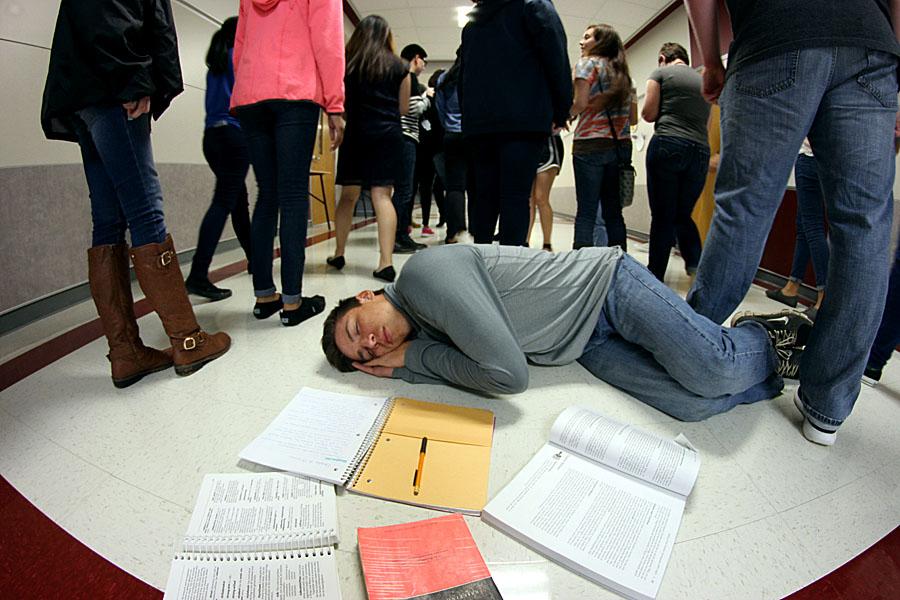Sleepy Lewisville
See how the effects of sleep deprivation impact student life
September 29, 2015
Job. School. Sleep.
What most students don’t realize is that this becomes a constant pattern in their daily lives.
It’s a constant balancing act between having the down time to let your mind relax and staying on your toes for work while also maintaining your grades at school. However sometimes this can lead to you becoming heavily sleep deprived.
Shocking as it might be, especially considering this reality, many students who don’t believe they’re sleep deprived aren’t aware they’re not getting enough sleep until they see common symptoms of the health issue.
This is what senior Gorgeous Taylor’s high school life has consisted of for the past four years, leaving her to balance her grades and work, which has greatly affected her health as well as impacted other aspects of her life.
“It’s hard to focus in school because I’m so sleepy, so I usually fall asleep in my classes or at the end of the day I just don’t have the energy to do anything, so I just end up trying to get as much sleep as I can,” Taylor said.
Though Taylor does experience this constant loss of sleep, she disagrees with the normality of sleep deprivation in high school teens.
“I think it’s horrible that kids are sleep deprived by around ninth grade or just in high school in general,” Taylor said. “At that age you should be sleeping a lot, so the fact that whatever we’re doing in our daily lives has kept us from getting enough sleep is pretty horrible and needs to be changed.”
For many students however, the health issue of sleep deprivation isn’t only a current concern, but a problem that can harm their well being in the future.
For senior Alexa Tizon the severity of her sleep deprivation both prevented her from excelling in school and clung to her in the form of bad habits.
“I have really bad sleeping habits,” Tizon said. “For example, when I used to work at night and we would go back to regular school schedule, I would only sleep until two a.m. because my body physically would not sleep anymore.”
Now Tizon worries about her current and future health, especially because she will be attending college in the near future.
“If I’m already sleep deprived now, imagine how sleep deprived I’ll be ten years from now when I’m in college,” Tizon said. “Not only that, but now I have really bad sleeping habits that will be hard to break later on.”
Depending on the degree of sleep deprivation the person is suffering from, the effects that can impact them mentally, emotionally and physically may vary from severe mental illnesses such as depression to lack of simple motor skills such as holding a pencil.
In previous graduate James Larsen’s case, the severity of the sleep deprivation had led to heavy repercussions that affected his daily life.
“I was depressed a lot more, quite often actually,” Larsen said. “I just had bad thoughts. I usually thought about hurting myself. I was tired and didn’t really feel like eating, didn’t really need to, or at least it felt like it.”
However, as time went on, Larsen’s sleep deprivation slowly went away and both his mental and physical health improved. As his body began to adjust to the normal amounts of sleep again, his life and mindset changed for the better.
“I now know that I myself have enough control to where I can keep myself from doing it, and I know I don’t have any reason to be doing it [because] it doesn’t help at all,” Larsen said.
Though sleep deprivation is a severe mental, emotional and physical illness, there are treatments that can both prevent and stop the illness over time to help any who may be dealing with it.
Some tips and tricks recommended depend on how severe the disease is impacting the person’s health. This means that treatments could range from taking a prescribed medication to making the inhabitants bedroom more comfortable.
Regardless of the severity of the health issue however, the issue of sleep deprivation weighs down on many students within the school, and even those who may be on treatment still have severe effects from sleep deprivation.
“Ideally this problem should and needs to be solved,” Tizon said. “If you want to improve our generation you need to allow them to get more sleep. Though most students don’t have an actual disease per se, they do have issues that are caused by sleep deprivation, and that’s not okay.”
